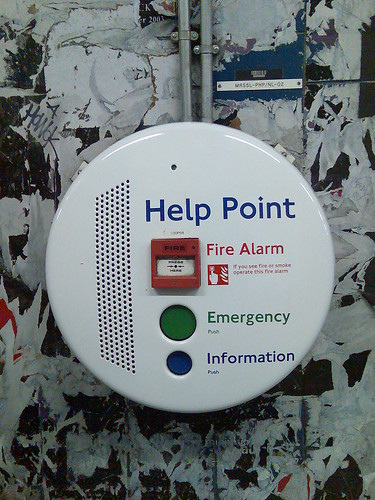Computer help is not always helpful
It’s very tempting to try to make life as easy as possible for end users by being proactive, ie anticipating what is likely to be useful to them, and then implementing that as a default option (or possibly not even an option, but compulsory).
 Help Point. Photo by Mark Hillary http://www.flickr.com/photos/markhillary/Perhaps some of your students will be tempted, when designing a computer program for use by non-technical people, to make it as ‘proactively helpful’ as possible. If so, they should beware. A good idea would be to undertake some market research, if only of a rudimentary nature, to avoid the pitfall of merely annoying people.
Help Point. Photo by Mark Hillary http://www.flickr.com/photos/markhillary/Perhaps some of your students will be tempted, when designing a computer program for use by non-technical people, to make it as ‘proactively helpful’ as possible. If so, they should beware. A good idea would be to undertake some market research, if only of a rudimentary nature, to avoid the pitfall of merely annoying people.
Here are three examples of where ‘help’ was or is not really very helpful at all.
Remember the paperclip?
When Word first came on the scene, you’d type a couple of words and this paperclip icon would appear and ask “Do you want to write a letter?” I am not aware of anyone who didn’t disable that ‘feature’ as soon as they figured out how to do so. It was intrusive, annoying and faintly patronising. After all, most people who take to a word processor would surely be able to figure out that to type a letter you would enter “Dear x” and then press the Return or Enter key? And if they didn’t, presumably they’d be intelligent enough to click on the Help icon. The paperclip was little more than an annoying waste of time.
The ICT On-screen test
When my colleagues and I were involved in designing this test, we thought it would be really helpful if, after a period of inactivity by the student, the program started to offer help. That’s because the program ‘assumed’ that inactivity meant that the student was stuck. User feedback, however, revealed that students were not necessarily stuck, they were working on paper, or thinking, trying to figure stuff out before doing anything on the computer. The offer of help was seen (by some at least) as an annoying intrusion, something which interrupted their stream of thought. Apparently, many students used the ‘Disable’ option to turn it off.
Facebook on my phone
Something on my phone – at least, I think it is ‘something’ rather than the Facebook app itself – has very helpfully inserted all my Facebook friends’ birthdays into the calendar on my phone. This means that I have notifications of birthdays of people I don’t know popping up virtually every day. I have looked up various help forums and none of the suggestions have worked so far – including ‘unfriending’ someone as an experiment.
I may uninstall the Facebook app, although from what I’ve read online this may not make any difference at all.
Yes, I know it is relatively trivial, but it is irritating. If I wanted to know when everyone’s birthday is then I’d have set it up myself. I really don’t need some unknown programmer deciding this for me!
I suppose the underlying assumption is that most people would want to know when their friends’ birthdays are coming up. That’s true, of course. However, it falls down because in reality most Facebook ‘friends’ are not really friends in the traditional sense. They’re people you interact with and find interesting, but not necessarily people you’d send a birthday card or present to.
Conclusion
Relating these experiences to the proposed Computing Programme of Study, if this goes through without amendment then students at Key Stage 2 will have to:
design and write programs that accomplish specific goals
and those at Key Stage 3 will have to:
undertake creative projects that involve selecting, using, and combining multiple applications, preferably across a range of devices, to achieve challenging goals, including collecting and analysing data and meeting the needs of known users (my emphasis)
It’s a great shame that the Key Stage 2 description doesn’t mention end users, because in theory you could achieve that aim by writing programs that do what they’re intended to do but for which nobody has any use. Hopefully, users’ needs will be considered. It is certainly explicit at Key Stage 3.
To avoid the trap of writing programs that are ‘too’ helpful, students will not only need to ask people how much help they would like, but (ideally), create one or two alternative versions for people to try out.
I realise this could be difficult and time-consuming, but it would be very interesting for students to try to rise to the challenge. I can think of ways in which it could be achieved without rewriting whole programs, but I think I’ll hold back, at least for now: I don’t want to be accused of spoiling people’s fun by being too helpful!